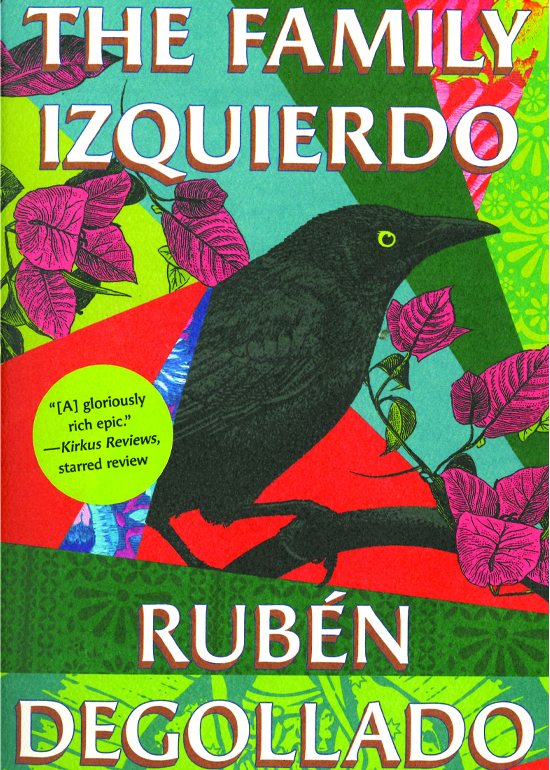We Are Family

The Family Izquierdo
by Rubén Degollado
New York: W.W. Norton, 2022.
304 pp. $16.95 Paperback.
Reviewed by
Emily Adams
The Family Izquierdo is a warm, teary-eyed hug of a novel. While these family lineage stories are told around the world, Degollado’s setting in McAllen, Texas, is what makes The Family Izquierdo engaging. The Izquierdos’ world is full of dualities: Mexican and American, mystical and pious, soft and strong. Degollado’s wide range of characters navigate these differences to varying degrees of success, which provide an emotional weight and nuanced depiction of his community.
The saga begins as Octavio and Victoria Izquierdo (Papá Tavo and Abuelita) cross the Río Bravo and pick out a piece of land. This land will become the receptacle of Papá Tavo’s dreams, hard work, and anxieties as he makes a life for his family del otro lado. Young Octavio is a dreamer who sees his immigration as reclaiming a piece of el norte for his family. Like many who cross, he holds a utopian vision of the American Dream that is for the “generations ahead, to the children he did not know, to the painting and drywall business he would pass on.” Papá Tavo’s dreams come true, but Tavo sacrifices himself in the progress.
Degollado’s treatment of mental health is commendable as he illustrates the fall of a strong patriarch plagued by depression and anxiety. The family struggles with the invisibility of mental health as questions about the source of Tavo's suffering become the center of the novel. Was he cursed by a jealous brujo neighbor? Did the stress of working his body bring him down? Is it simply the bad Izquierdo blood? As we watch each Izquierdo reflect on their father’s pain, Degollado subtly asks us to inspect the underlying machismo that pushes men, even ones like sweet Tavo, too far. Degollado’s holistic picture of the family and the neighborhood frames the tragedy of Tavo’s suffering as larger than himself: a pain inflicted by the cultural expectations of men and economic realities of being an immigrant.
The structure of the novel provides the grand portrait of the Izquierdo Family from the varying perspectives of the children and grandchildren. Some of the characters are thinly drawn—Tío Gonzalo drinks away the weight of being the oldest male; cousin Cirilio acts like a gangster but has a kind heart; cousins Teresa, Dianira, and Yesenia are devout angels who experience Catholic miracles like the Virgin of Guadalupe. In fact, while the men are searchers who establish the stories of their manhood, most of the women are painted as saints who perform miracles through love and devotion. Abuelita always has the answer. Tía Magdelena heals a mentally challenged neighbor’s alcoholism with a haircut. Tía Victoria, Gonzalo’s wife, is the perfect woman: she can cook and clean, she is devoted to her mother-in-law, and, as we are frequently reminded by all male members of the family—she’s beautiful. Yet, their ultra-feminine presence juxtaposes the machismo weighing on the men. The Izquierdo women provide an empathy that the men rarely extend to themselves, and as the Izquierdo men age, they see the women as a source of strength. Pain is shared across the family, lightening the load for everyone, as the men learn to temper their pride.
When the quest for a mystical source of Papá Tavo’s affliction fades into the background, a complex vision of love steps in to drive the action. Gonzalo drinks out of fear that his devotion to family is not enough. Dina’s agoraphobia, or fear of the evil ojo, is a product of grieving her father. Cirilio only activates his violent-gangster side when his little cousin is threatened. The family binds together through these hurdles, even when they disagree. Tavo’s utopian vision is driven by love, and his success isn’t owning the land or establishing their family business. It is the love he taught them that steers the family through the difficult reality on this side of the American dream.
The Family Izquierdo has its lineage in both the family saga and the border story. However, while the border often separates families, it has pushed the Izquierdos together. This is a family, and a community, that has managed to maintain their culture while also allowing it to develop in their new surroundings. Overall, the novel is a solid first effort for Degollado and an important depiction of the deep love and duality that define so many families in Texas.
Emily Adams is a graduate student from Austin, Texas.
